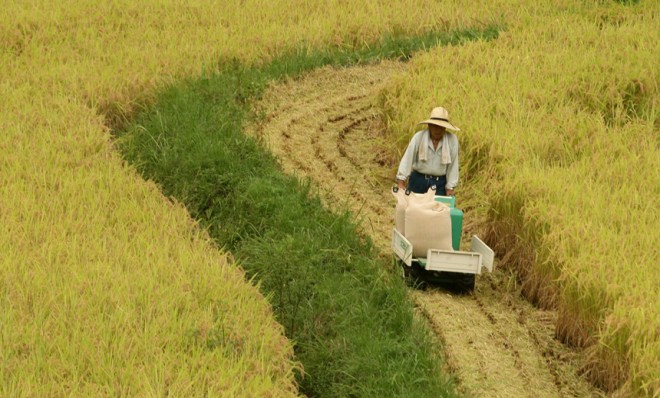Why Asia is letting millions of tons of extra rice go to waste
Welcome to the perverse world of agricultural protectionism

A free daily email with the biggest news stories of the day – and the best features from TheWeek.com
You are now subscribed
Your newsletter sign-up was successful
Rice stockpiles are reaching record highs in Asia, where farmers are harvesting the crop faster than governments can sell it.
A good monsoon season and government incentives are driving what the U.S. Department of Agriculture is expecting to be a record-breaking year in rice production. Indian Agriculture Minister Sharad Pawar has told reporters that the production of food grains this season in India alone should break all previous records.
The bonanza is coming on top of the fact that the the world's biggest rice producers already have way more rice than they know what to do with. Thailand has squirreled away 17 million tons of surplus rice, collected through a subsidy program in which the government buys rice from farmers at almost 50 percent above market price. At the same time, Japan's stockpiles at the end of June swelled 26 percent to the highest level in 11 years — paradoxically, because higher domestic prices have weakened demand.
The Week
Escape your echo chamber. Get the facts behind the news, plus analysis from multiple perspectives.

Sign up for The Week's Free Newsletters
From our morning news briefing to a weekly Good News Newsletter, get the best of The Week delivered directly to your inbox.
From our morning news briefing to a weekly Good News Newsletter, get the best of The Week delivered directly to your inbox.
The timing is not so great for this giant rice glut, with demand from big importers like Nigeria and the Indonesia falling off. In Nigeria, imports this year will drop 10 percent to 2.7 million tons, while imports from Indonesia are expected to drop 28 percent.
But most perversely of all, no one is benefiting from all this extra food lying around — no one, that is, except farmers who form powerful political constituencies within their respective countries.
The governments of India and Thailand, for example, are reluctant to offload rice onto the market, fearing it will cause prices to collapse. Japan, meanwhile, has one of the most protected rice-farming industries in the world, with a 778 percent tariff on imported rice.
"The tightly regulated and fragmented rice market means consumers and the needy have seen little benefit from the oversupply," says The Wall Street Journal. "Some aid groups favor handouts before stocks deteriorate, while others said governments should encourage a move to other crops by cutting guaranteed prices to farmers."
A free daily email with the biggest news stories of the day – and the best features from TheWeek.com
Lily Kuo of Quartz says the extra rice could help ameliorate concerns about rising global food costs. As droughts in other areas drive up food prices, rice "could ease the squeeze in at least half of the world, especially developing countries, where it is a main food staple."
Thailand is running out of money, and space, to continue purchasing rice from its farmers and keeping it in warehouses. Exporters say the country will have to start selling from its stockpiles, which have doubled in the last two years. Once those are emptied, analysts say, we could see low rice prices for years to come. [Quartz]
Devinder Sharma, chairman of the New Delhi-based nonprofit Forum for Biotechnology and Food Security, agrees. "In countries such as Thailand and India hunger is still persistent, and it is a crime against humanity if rice gets rotten while poor people starve," he told The Wall Street Journal. "A better option would be to supply this grain for free to the poor."
Carmel Lobello is the business editor at TheWeek.com. Previously, she was an editor at DeathandTaxesMag.com.
-
 Democrats push for ICE accountability
Democrats push for ICE accountabilityFeature U.S. citizens shot and violently detained by immigration agents testify at Capitol Hill hearing
-
 The price of sporting glory
The price of sporting gloryFeature The Milan-Cortina Winter Olympics kicked off this week. Will Italy regret playing host?
-
 Fulton County: A dress rehearsal for election theft?
Fulton County: A dress rehearsal for election theft?Feature Director of National Intelligence Tulsi Gabbard is Trump's de facto ‘voter fraud’ czar